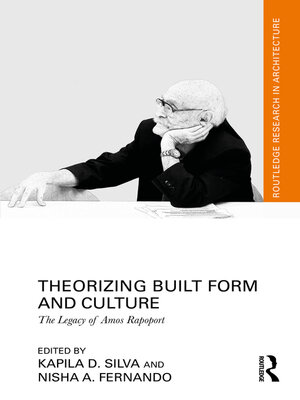Theorizing Built Form and Culture
ebook ∣ The Legacy of Amos Rapoport · Routledge Research in Architecture
By Kapila D. Silva

Sign up to save your library
With an OverDrive account, you can save your favorite libraries for at-a-glance information about availability. Find out more about OverDrive accounts.
Find this title in Libby, the library reading app by OverDrive.



Search for a digital library with this title
Title found at these libraries:
| Library Name | Distance |
|---|---|
| Loading... |
In this collection of essays, Theorizing Built Form and Culture: The Legacy of Amos Rapoport – a felicitation volume to celebrate the significance of Professor Amos Rapoport's lifelong scholarship – scholars from around the world discuss the analytical relevance, expansion, and continuing application of these contributions in developing an advanced understanding of mutual relationships between people and built environments across cultures.
Professor Amos Rapoport has espoused an intellectual and theoretical legacy on environmental design scholarship that explains how cultural factors play a significant role in the ways people create and use environments as well as the way environments, in turn, influence people's behavior. This volume presents a hitherto-not-seen, unique, and singular work that simultaneously articulates a cohesive framework of Rapoport's architectural theories and demonstrates how that theoretical approach be used in architectural inquiry, education, and practice across environmental scales, types, and cultural contexts. It also acknowledges, for the very first time, how this theoretical legacy has pioneered the decolonizing of the Eurocentric approaches to architectural inquiry and has thus privileged an inclusive, cross-cultural perspective that laid the groundwork to understand and analyze non-Western design traditions. The book thus reflects a wide range of cross-cultural and cross-contextual range to which Professor Rapoport's theories apply, a general notion of theoretical validity he always advocated for in his own writings.
The volume is a paramount source for scholars and students of architecture who are interested in understanding how culture mediates the creation, use, and preservation of the built environment.







